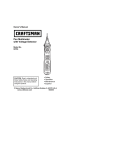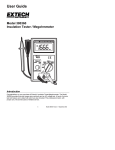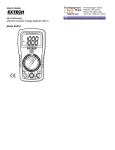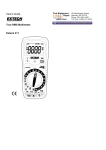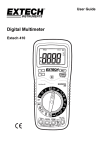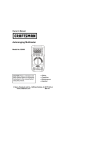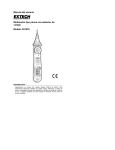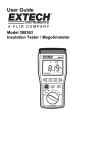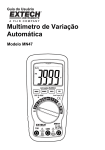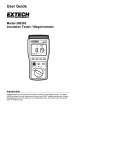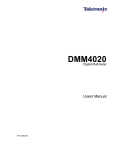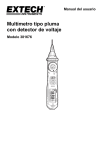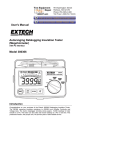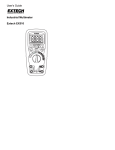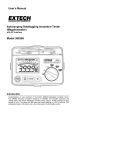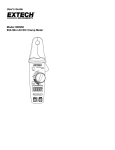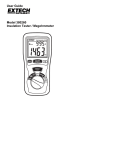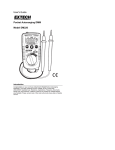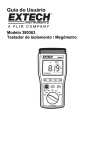Download User Manual in PDF
Transcript
User's Guide Pen Multimeter with Voltage Detector Model 381676 Introduction Congratulations on your purchase of the Extech Model 381676. This instrument provides AC/DC Voltage, Resistance, Diode, & Continuity testing plus a built-in non-contact Voltage Detector. Proper use and care of this meter will provide many years of reliable service. Safety WARNING: Improper use of this device can result in electric shock or damage to the meter. Follow all safety guidelines presented in this manual and the usual safety precautions used when working with electrical circuits. This meter has been designed according to IEC-1010 with respect to electronic measurement instrumentation with an overvoltage category CAT III 600V and pollution 2. Preliminary Safety When using the meter, observe all normal safety rules concerning: • Protection against the dangers of electrical current • Protection of the meter against misuse When the meter is delivered, check that it has not been damaged in transit. When checking voltage, always test the meter on a known live circuit first. Test leads must be in good condition. Before use, verify that the test lead insulation is intact and free from lead wire exposure or other damage. Use only the supplied test leads. Safety During Use • • • • • • • • • • • • • • Be sure to set the appropriate function and range before use Never exceed the limits indicated in the specification table of this manual. Never touch probes, test leads, or alligator clip when connected to live circuit. Do not measure voltage on terminals that exceed 600V above earth ground. Always use caution when working with voltages above 60VDC or 30VACrms. Keep fingers behind probe barrier when taking measurements. Never connect test leads across a voltage source while the rotary switch is in the resistance, continuity, or diode mode of operation. Never perform resistance, continuity, or diode tests on live circuits. When taking non-contact voltage measurements ensure that the positive test lead is NOT exposed and that the negative (common) test lead is not connected to the bottom of the meter. Before changing functions using the rotary function dial, be sure to disconnect the meter’s test leads from any circuit under test. Never use the meter in an explosive environment or where dust, dirt, or steam exists. Never use the meter if the housing or battery compartment is open. Do not store meter in direct sunlight, high temp./humidity, or condensation. If the equipment is used in a manner not specified by the manufacturer, the protection provided by the equipment may be impaired. ALWAYS discharge filter capacitors in power supplies and disconnect the power when making resistance or diode tests. Safety Symbols This symbol adjacent to another symbol, terminal or operating device indicates that the operator must refer to an explanation in the Operating Instructions to avoid personal injury or damage to the meter. This symbol indicates that a device is protected throughout by double insulation or reinforced insulation. This symbol advises the user that the terminal(s) so marked must not be connected to a circuit point at which the voltage with respect to earth ground exceeds 600V. This symbol indicates compliance to the European Union directive 381676 V2.0 06/06 2 Controls and Jacks 1 4 5 6 7 9 8 10 12 381676 COM 11 Display Symbols •))) 2 3 PEN MU LTIMETER+VO LTAGE DETECTO R 1. Retractable positive test lead 2. Test lead retracting nut 3. AC voltage detector and warning light 4. Finger protection barrier 5. Rotary function dial 6. Sensitivity adjustment for AC volt detector 7. RANGE button 8. FUNCTION button 9. MAX HOLD button 10. DATA HOLD button 11. Common (negative) test lead jack 12. LCD display Note: The battery compartment is located on the rear of the instrument Audible Continuity V Volts Diode function Ω Ohms Data Hold Low battery D.H m milli (10-3) (volts) DC Direct current k kilo (103) ohms AC Alternating current M Meg (106) ohms M.H Maximum Hold Max. Input Limit Specification Measurement Voltage DC or AC Input Limit 200mV range: 250VDC or AC All other ranges: 600VDC or VAC Resistance, Continuity, and Diode 250VDC or VAC 3 381676 V2.0 06/06 Operating Instructions WARNING: Risk of electrocution. High-voltage circuits, both AC and DC, are very dangerous and should be measured with great care. NOTE: On some low AC and DC voltage ranges, with the test leads not connected to a device, the display may show a random, changing reading. This is normal and is caused by the high-input sensitivity. The reading will stabilize and give a proper measurement when connected to a circuit. NOTE: The supplied black test leads (standard test lead and alligator clip probe) have protective plugs that must be removed before being inserted in the bottom of the meter. The protective apparatus must be removed from the end of the lead that plugs into the meter. NON-CONTACT AC VOLTAGE DETECTOR WARNING: Test the AC voltage detector on a known live circuit before each use. WARNING: Before using the meter in the AC Voltage Detector mode, verify that the batteries are fresh by confirming characters appear on the LCD when the function dial is turned to the voltage (V) position. Do not attempt to use the meter as an AC Voltage Detector if the batteries are weak or bad. With the function switch set to the NCV position, this instrument can detect the presence of AC voltage (from 50 to 600VAC) simply by being held very near to a voltage source. The NCV function works when the meter’s function dial is placed in the NCV position only. 1. Ensure that the retractable test lead is fully retracted. 2. Disconnect the common (negative) test lead from the bottom of the meter. 3. Put the function switch to NCV position. 4. Test the detector on a known live circuit. 5. Hold the top of the meter very close to the voltage source as shown. 6. Adjust the sensitivity dial to the highest sensitivity position (fully counter-clockwise) and then lower the sensitivity as required. 7. If voltage is present, the light at the top of the meter will flash and the alarm will sound. 4 381676 V2.0 06/06 AC VOLTAGE MEASUREMENTS WARNING: Risk of Electrocution. The probe tips may not be long enough to contact the live parts inside some 240V outlets for appliances because the contacts are recessed deep in the outlets. As a result, the reading may show 0 volts when the outlet actually has voltage present. Make sure the probe tips are touching the metal contacts inside the outlet before assuming that no voltage is present. CAUTION: Do not measure AC voltage if a motor on the circuit is being switched ON or OFF. Large surges may occur that can damage the meter. 1. Set the function dial to the V position. 2. Use the FUNC button to select AC. Insert the black test lead banana plug into the negative jack at the bottom of the meter. Unscrew the retracting nut (clockwise) to draw out the positive test lead. Touch the black test probe tip to the neutral side of the circuit. Touch the positive test probe tip to the “hot” side of circuit. Read the voltage on the display. The meter automatically selects the optimum range or the user may manually select a range using the RANGE button. 3. 4. 5. 6. 7. DC VOLTAGE MEASUREMENTS CAUTION: Do not measure DC voltages if a motor on the circuit is being switched ON or OFF. Large voltage surges may occur that can damage the meter. 1. 2. 3. 4. 5. 6. 7. Set the function dial to the V position. Use the FUNC button to select DC. Insert the black test lead banana plug into the negative jack at the bottom of the meter. Carefully turn the positive test lead retracting nut (located at the top of the meter) clockwise to completely draw out the positive test lead probe. Touch the black test probe tip to the negative side of the circuit. Touch the positive test probe tip to the positive side of the circuit. Read the voltage on the display. The meter automatically selects the optimum range or the user may manually select a range using the RANGE button. 5 381676 V2.0 06/06 RESISTANCE MEASUREMENTS WARNING: To avoid electric shock, disconnect power to the unit under test and discharge all capacitors before taking any resistance measurements. 1. Set the function switch to the Ω 2. 3. Use the FUNC button to select the resistance mode Ω. Insert the black test lead banana plug into the negative jack at the bottom of the meter. Carefully turn the test lead retracting nut (located at the top of the meter) clockwise to completely draw out the positive test lead probe. Touch the test probe tips across the circuit or part under test. It is best to disconnect one side of the part under test from the circuit so the rest of the circuit will not interfere with the resistance reading. Read the resistance on the display. The meter automatically selects the optimum range or the user may manually select a range using the RANGE button. 4. 5. 6. position. AUDIBLE CONTINUITY CHECK WARNING: To avoid electric shock, never measure continuity on circuits that have a voltage potential. 1. 2. 3. 4. 5. 6. Set the function switch to the Ω position. Use the FUNC button to select the audible continuity mode Insert the black test lead banana plug into the negative jack at the bottom of the meter. Carefully turn the test lead retracting nut (located at the top of the meter) clockwise to completely draw out the positive test lead probe. Touch the test probe tips to the circuit or wire under test. If the resistance is less than approximately 50Ω, the audible tone will sound. If the circuit is open, the display will indicate “OL”. DIODE TEST 1. 2. 3. 4. 5. 6. 7. Set the function switch to the Ω position. Use the FUNC button to select the diode function Insert the black test lead banana plug into the negative (common) jack at the bottom of the meter. Carefully turn the test lead retracting nut (located at the top of the meter) clockwise to completely draw out the positive test lead probe. Touch the test probes to the diode under test. A good diode will indicate approx. 0.3V (germanium diodes) to 0.7V (silicon diodes) for the forward test and “OL” for the reverse test. A shorted diode will indicate the same value of voltage in both the reverse and forward test directions. An open diode will indicate “OL” in both test directions. 6 381676 V2.0 06/06 DATA HOLD Button To freeze a displayed reading, press the DATA H button. The reading will freeze and the D.H display icon will be visible on the LCD. To release the display, press the DATA H button again. The DH indicator will switch off and the display will again show real time readings. MAXIMUM HOLD Button To display only the highest reading, press the MAX H button. The M.H display icon will be visible on the display while in the Max Hold mode. Now, the display will only change when a higher reading than the displayed reading is encountered. To return to normal operation, press the MAX H button again (the MH display icon will switch off). FUNC (Function) BUTTON The FUNC (function) button is used to select AC or DC while in the VOLTAGE (V) mode. The FUNC button is also used to select diode , Continuity , or Resistance Ω while in the Ω mode. RANGE Button The meter automatically selects the optimum range; however, the meter’s ranges can be selected manually. When using the RANGE button to manually select a range, start with the highest range and then select successively lower ranges until the desired range is reached. The decimal place will move with each press of the RANGE button. Automatic Power OFF The meter is equipped with an automatic power off feature to preserve battery energy. After 15 minutes of inactivity, the meter will automatically turn off. To turn the meter on again, simply rotate the function switch to the desired function. Support line (781) 890-7440 Technical support: Extension 200; E-mail: [email protected] Repair & Returns: Extension 210; E-mail: [email protected] For the latest version of this User’s Guide, Software updates, and other up-to-the-minute product information, visit our website: www.extech.com For up-to-the-minute product information, visit our website: www.extech.com Extech Instruments Corporation, 285 Bear Hill Rd., Waltham, MA 02451 Copyright © 2006 Extech Instruments Corporation. All rights reserved including the right of reproduction in whole or in part in any form. 7 381676 V2.0 06/06 Maintenance WARNING: To avoid electrical shock, disconnect the test leads from any source of voltage before removing the back cover or the battery cover. WARNING: To avoid electrical shock, do not operate the meter until the battery cover is in place and fastened securely. This meter was designed to provide years of dependable service. However, if the following guidelines are not followed, the dependability of the meter can be compromised: 1. 2. 3. 4. 5. 6. KEEP THE METER DRY. If it gets wet, wipe it off and allow it to dry before use. USE AND STORE THE METER IN NORMAL TEMPERATURES. Environmental extremes can shorten the life of the electronic parts and distort or melt plastic parts. HANDLE THE METER GENTLY AND CAREFULLY. KEEP THE METER CLEAN. Wipe the case occasionally with a damp cloth. Do not use chemicals, cleaning solvents, abrasives, or detergents. USE ONLY FRESH BATTERIES OF THE RECOMMENDED SIZE/TYPE. IF THE METER IS TO BE STORED FOR A LONG PERIOD REMOVE THE BATTERIES Battery Replacement WARNING: To avoid electrical shock, disconnect the test leads from any source of voltage before removing the battery cover. Do not operate meter unless the batteries are in place. 1. The icon will appear when battery voltage is low. 2. Turn the Function dial to the OFF position. 3. Disconnect the negative (common) test lead from the meter. 4. Fully retract the positive test lead probe. 5. Remove the Phillips head screw at the rear center of the meter housing. 6. Remove the battery compartment cover to access the batteries. 7. Replace the two (2) 1.5V ‘AAA’ batteries observing polarity. 8. Secure the battery compartment cover. Warranty EXTECH INSTRUMENTS CORPORATION warrants this instrument to be free of defects in parts and workmanship for one year from date of shipment (a six month limited warranty applies on sensors and cables). If it should become necessary to return the instrument for service during or beyond the warranty period, contact the Customer Service Department at (781) 8907440 ext. 210 for authorization or visit our website at www.extech.com. A Return Authorization (RA) number must be issued before any product is returned to Extech. The sender is responsible for shipping charges, freight, insurance and proper packaging to prevent damage in transit. This warranty does not apply to defects resulting from action of the user such as misuse, improper wiring, operation outside of specification, improper maintenance or repair, or unauthorized modification. Extech specifically disclaims any implied warranties or merchantability or fitness for a specific purpose and will not be liable for any direct, indirect, incidental or consequential damages. Extech's total liability is limited to repair or replacement of the product. The warranty set forth above is inclusive and no other warranty, whether written or oral, is expressed or implied. 8 381676 V2.0 06/06 Specifications Function Non-contact AC Voltage detector (NCV) DC Voltage (VDC) Range 50 to 600V Resolution NA 200mV 2.000V 20V 200V 600V AC Voltage (VAC) 200mV (40 – 400Hz) 2.000V 20V 200V 600V 0.1mV 1mV 0.01V 0.1V 1V 0.1V 1mV 0.01V 0.1V 1V Resistance (open circuit voltage: 0.25V) 0.1Ω 0.001kΩ 0.01kΩ 0.1kΩ 0.001MΩ 0.01MΩ 200Ω 2kΩ 20kΩ 200kΩ 2MΩ 20MΩ Accuracy ±(0.7% reading + 2 digits) ±(0.8% reading + 3 digits) ±(1.0% reading + 3 digits ±(1.0% of reading + 3 digits) ±(1.0% of reading + 1 digit) ±(1.0% of reading + 5 digits) Accuracy Notes: Accuracy specifications consist of two elements: • (% reading) – This is the accuracy of the measurement circuit • (+ digits) – This is the accuracy of the analog to digital converter Accuracy is stated at 65oF to 83oF (18oC to 28oC) and less than 75% RH General Specifications Diode Test: Continuity Check Display Input Impedance Over-range indication Auto Power Off Polarity Measurement Rate Low Battery Indication Batteries Operating Temperature Storage Temperature Operating Humidity Storage Humidity Operating Altitude Weight / Size Safety Forward DC bias Current: 1mA approx.; Reverse DC bias voltage: 1.5V approx. Overload protection: 250VDC or ACrms Audible signal will sound if the resistance is less than 50Ω Open circuit voltage: 0.5V; Overload protection: 250VDC or AC 2000 count (0 to 1999) LCD 10MΩ , AC & DC Voltage ‘OL’ is displayed After 15 minutes (approx.) of inactivity Automatic (no indication for positive readings) Minus (-) sign for negative readings. 2 times per second, nominal “ ” is displayed to alert battery replacement Two (2) 1.5V ‘AAA’ batteries 41ºF to 104ºF (5ºC to 40ºC) -4oF to 140oF (-20oC to 60oC) Max 80% up to 87ºF (31ºC) decreasing linearly to 50% at 104ºF(40ºC) <80% 6560ft. (2000meters) operating 3.9oz (110g) / 8.2 x 1.5 x 1.1“(208 x 38 x 29mm) For indoor use and in accordance with the requirements for double insulation to IEC1010-1 (1995): EN61010-1 (1995) Overvoltage Category III, Pollution Degree 2. 9 381676 V2.0 06/06









